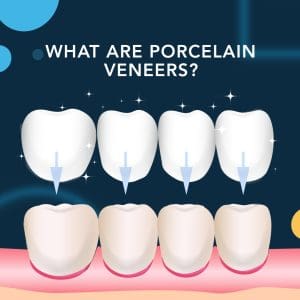Dental veneers are a widely favored option in cosmetic dentistry as they offer a transformative solution for enhancing smiles by correcting chips, gaps, or uneven teeth. In this comprehensive guide, we will explore the numerous benefits of veneers, provide you with some of the lesser-known side effects, and discuss the essential maintenance practices that veneers require. Whether you’re considering veneers for aesthetic improvement or to address specific dental concerns, this article will equip you with valuable insights and detailed information to help you make a well-informed decision.
What are Dental Veneers?
Dental veneers are thin, custom-made shells designed to improve the appearance of teeth by covering their front surface. Typically made from porcelain or composite resin, veneers are bonded to the teeth, offering a solution for various cosmetic concerns such as discoloration, chips, or gaps. They are crafted to match the natural color and shape of your teeth, providing a quick and durable smile makeover.
How do Veneers Work?
Dental veneers offer a quick and relatively non-invasive way to transform your smile. By adhering a thin layer of material (typically porcelain or composite resin) directly to the teeth, veneers can significantly improve the appearance of your smile in just a few visits to the dentist. This procedure, while fast and effective, is meticulously designed to enhance the look of your teeth with minimal discomfort.
Consultation & Planning
The initial step in getting dental veneers is to have a thorough consultation and planning session with your dentist. During this phase, your dentist will assess your dental health and discuss your smile goals. They will also take X-rays and make impressions of your mouth to ensure that the veneers will be perfectly tailored to your teeth.
Tooth Preparation
The process of preparing teeth for veneers involves reshaping the tooth surface. A dentist removes a thin layer of enamel, usually less than a millimeter, to create space for the veneer. This ensures that the veneers fit well and look natural while also providing a strong bonding surface for the adhesive. Most patients experience minimal discomfort during this procedure, as it is generally not painful, and local anesthesia can be used to eliminate any potential sensitivity.
Impressions
After tooth preparation, your dentist will take precise impressions of your teeth. These molds are critical as they are sent to a dental lab where your custom veneers will be created. The accuracy of these impressions ensures that the veneers fit perfectly over your teeth, providing a natural look and comfortable feel.
Fabrication
After taking impressions of your prepared teeth, the molds are sent to a dental laboratory, where the veneers are actually fabricated. Here, skilled technicians craft the veneers using either porcelain or composite resin, making sure each piece matches the color, shape, and size required to blend seamlessly with your natural teeth.
Fitting
The fitting of veneers is a meticulous process where your dentist places the custom-made shells onto your teeth to check their fit and color. Adjustments are made as necessary to ensure the veneers perfectly align with and complement your natural teeth. Once the ideal fit is confirmed, the veneers are permanently bonded to the tooth surface.
Bonding
The bonding process is the final step in applying veneers. Your dentist applies a special adhesive to your prepared teeth, followed by the placement of the veneers. A light beam is then used to harden the adhesive quickly, securing the veneers firmly in place.
What are the Different Types of Veneers?
Dental veneers are a transformative option for those seeking to improve their smile, but not all veneers are created equal. Various types of veneers, such as porcelain, composite, and no-prep veneers, offer unique benefits and considerations. Each type has its own distinct characteristics in terms of durability, appearance, and application process. Understanding these differences will help you make an informed decision about which type best suits your needs and lifestyle.
Porcelain Veneers
Porcelain veneers are a popular choice for their natural appearance and strength. Made from high-quality ceramic, they are custom-crafted to fit precisely over your existing teeth. Porcelain resists stains better than resin and can mimic the light-reflecting properties of natural teeth, offering a durable and aesthetically pleasing solution for correcting a chipped or gapped smile.
Composite Resin Veneers
Composite resin veneers are crafted directly on your teeth using a tooth-colored resin material that is sculpted and hardened with a special light. They are less invasive and more cost effective than porcelain veneers, but they may require more maintenance as they are less resistant to staining and have a shorter lifespan.
Lumineers
Lumineers are a type of ultra-thin, no-prep veneer made from patented dental porcelain. They are about as thin as a contact lens and require minimal to no removal of the tooth structure. Lumineers are an excellent choice for those looking to enhance their smile without needing extensive dental work.
Removable Veneers (Snap-On Veneers)
Removable veneers, also known as snap-on veneers, offer a temporary and non-invasive alternative to traditional veneers. Made from dental resin, they simply clip over your existing teeth, providing an instant aesthetic improvement without any permanent alteration to the tooth structure. This option is ideal for special events or as a trial before committing to permanent veneers.
Palatal Veneers
Palatal veneers are custom-fitted shells designed to protect the back (palatal) surfaces of the teeth, primarily the upper front teeth. They are often used to manage conditions like tooth wear due to grinding or acid erosion. Made typically from durable materials like gold or porcelain, palatal veneers help restore tooth function and prevent further damage.
Benefits of Dental Veneers
There are numerous benefits of dental veneers to consider when exploring cosmetic dental treatments. Veneers offer a versatile solution to a variety of dental concerns, enhancing both the functionality and appearance of your teeth. With the potential to significantly improve one’s smile, they remain a popular choice for those seeking a durable and effective dental restoration option.
Natural Appearance
One significant benefit of dental veneers is their natural appearance. Veneers are meticulously crafted from materials like porcelain or composite resin, which mimic the light-reflecting properties and texture of natural teeth. They can be precisely color-matched to your adjacent teeth, ensuring that the enhancements blend seamlessly with your smile, making them virtually indistinguishable from your real teeth.
Durability
Dental veneers are widely appreciated for their durability. Constructed from sturdy materials, veneers can endure the daily wear and tear of dental functions and can last for many years with proper care. Typically, with diligent maintenance, veneers can remain in good condition for 10 to 15 years, making them a long-term solution for enhancing dental aesthetics and functionality.
Stain Resistance
Dental veneers, especially those made from porcelain, have a significant advantage in resisting stains. Unlike natural tooth enamel, which can absorb stain-causing foods and drinks, porcelain veneers are largely unaffected by discoloration. This means they can maintain a bright, white appearance over time, contributing to a consistently attractive smile.
Minimally Invasive
Dental veneers offer a minimally invasive solution to improving your smile. Compared to other cosmetic dental procedures, veneers require a minimal amount of tooth enamel removal to fit. This conservative approach preserves more of your natural tooth structure while still making significant visual enhancements, making veneers a less invasive yet effective option for cosmetic dental restoration.
 Immediate Results
Immediate Results
Dental veneers provide immediate results, transforming your smile quickly and effectively. Once applied, veneers instantly correct imperfections such as discoloration, chips, and gaps. This rapid improvement is ideal for those who desire a significant cosmetic enhancement without the extended treatment times associated with other dental procedures like braces. Typically, the procedure for applying veneers can be completed in just one to two appointments, each lasting about one to two hours, depending on the number of veneers being placed.
Low Maintenance
Once dental veneers are applied, they require minimal maintenance. Regular brushing, flossing, and routine dental check-ups are all that’s needed to keep them in good condition. This simplicity makes veneers a convenient choice for enhancing your smile without the need for extensive or complicated maintenance routines.
Are There Any Side Effects to Veneers?
While dental veneers offer many benefits, it’s important to be aware of some potential side effects. These effects can vary based on individual circumstances and the specific procedures involved. Being informed about these possible downsides helps ensure that you can make a well-rounded decision about whether veneers are the right choice for your dental health and smile goals.
Tooth Sensitivity
One possible side effect of getting dental veneers is increased tooth sensitivity. This occurs because the process often involves removing a thin layer of enamel, which can expose the underlying dentin. This exposure may lead to heightened sensitivity to hot, cold, and sweet foods and beverages.
Permanent Alteration of Teeth
Getting dental veneers involves a permanent alteration of the teeth. To ensure a proper fit and natural appearance, a thin layer of enamel is removed from the front surface of each tooth. This process is irreversible, committing you to veneers or similar coverings for the lifespan of the treated teeth.
Risk of Damage
Another side effect of getting dental veneers is the risk of damage. While durable, veneers are not indestructible and can chip or crack if subjected to excessive force, such as biting hard objects or teeth grinding. Proper care and avoiding habits that put undue stress on veneers are required to prolong their lifespan.
Color Mismatch
One potential side effect of getting veneers is color mismatch. If the shade of the veneers does not perfectly match the surrounding natural teeth, it can lead to an uneven or artificial appearance. This can happen because the color of natural teeth may change over time, creating a contrast with the non-discoloring veneers.
Gum Tissue Response
Another side effect to consider when getting veneers is the response of the gum tissue. Some individuals may experience irritation or inflammation around the veneers. This reaction can vary depending on the compatibility of the materials used and the precision of the fit between the veneers and the natural gum line.
Decay Under Veneers
A significant side effect of getting veneers is the potential for decay under the veneers. If veneers are not properly sealed or if they become damaged, bacteria can infiltrate and accumulate beneath them, leading to tooth decay. Regular dental check-ups are essential to monitor and address any issues promptly to prevent decay.
How Do You Take Care of Veneers?
Caring for dental veneers is simple yet important. Proper maintenance not only helps preserve their appearance but also ensures the health of your natural teeth underneath. By following recommended care practices, you can keep your veneers looking great and maintain good dental health for years to come.
Practice Good Oral Hygiene
It’s important to take care of dental veneers to prevent issues like staining, chipping, or premature wear. Proper maintenance not only keeps veneers looking good and functioning well but also helps avoid potential problems that could affect your oral health. Neglecting proper care can result in expensive repairs or replacements, so regular upkeep and check-ups with a dentist in Davie, FL, are essential.
Use a Soft-Bristled Tooth Brush
To protect your dental veneers, you should use a soft-bristled toothbrush. This type of brush is gentle on both the porcelain material and your gums, reducing the risk of scratching the veneer surface or causing gum irritation. Gentle brushing helps maintain the integrity and appearance of your veneers over time.
Beware of Hard Foods
Caring for your dental veneers means being cautious with hard foods. Biting into foods like ice, hard candies, or nuts can damage veneers by causing chips or cracks. To preserve the longevity and appearance of your veneers, it’s advisable to avoid chewing hard objects and choose softer foods instead.
Avoid Using Teeth as Tools
To prolong the lifespan of your dental veneers, refrain from using your teeth for tasks such as opening packaging, biting nails, or holding items. These activities can exert excessive pressure on the veneers, potentially causing chips or detachment. Instead of risking damage, you can protect your veneers by using the appropriate tools for these tasks.
Attend Regular Dental Checkups
Attending regular dental checkups is vital for maintaining the health and longevity of your dental veneers. These visits allow your dentist to monitor the condition of your veneers, checking for any signs of wear or damage and ensuring the underlying teeth remain healthy. Regular professional care helps prevent potential issues and extends the life of your veneers.
Schedule a Dental Checkup Appointment
Scheduling regular dental checkups with a Davie dentist is recommended for everyone, especially for those with dental veneers. During these appointments, your dentist can thoroughly examine your veneers for any signs of wear or damage, ensuring they continue to look and function as intended. These checkups also provide an opportunity to professionally clean your veneers and address any potential oral health issues early.
If you’re thinking about improving your smile with veneers, it’s important to consult with a dental professional. A dentist can assess your oral health in detail, discuss your aesthetic goals, and determine whether veneers are the right option for you. They can also explain the procedure, potential outcomes, and any necessary aftercare. This professional guidance will ensure that you are well-informed and prepared for your journey towards a brighter, more confident smile. Call our office to schedule an appointment or find a local dentist near me in Broward County.
November 22, 2024

 Adult
Adult



 Immediate Results
Immediate Results